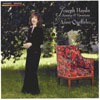Haydn: Unexpected Encounters
Two very fine Haydn discs, either of which would enhance your collection
View record and artist detailsRecord and Artist Details
Composer or Director: Joseph Haydn
Genre:
Instrumental
Label: Mirare
Magazine Review Date: 2/2010
Media Format: CD or Download
Media Runtime: 61
Mastering:
Stereo
Catalogue Number: MIR104

Tracks:
| Composition | Artist Credit |
|---|---|
| Sonata for Keyboard No. 62 |
Joseph Haydn, Composer
Anne Queffélec, Piano Joseph Haydn, Composer |
| Variations |
Joseph Haydn, Composer
Anne Queffélec, Piano Joseph Haydn, Composer |
| Sonata for Keyboard No. 53 |
Joseph Haydn, Composer
Anne Queffélec, Piano Joseph Haydn, Composer |
| Sonata for Keyboard No. 54 |
Joseph Haydn, Composer
Anne Queffélec, Piano Joseph Haydn, Composer |
Composer or Director: Joseph Haydn
Genre:
Instrumental
Label: Ondine
Magazine Review Date: 2/2010
Media Format: CD or Download
Media Runtime: 0
Mastering:
Stereo
Catalogue Number: ODE1154-2

Tracks:
| Composition | Artist Credit |
|---|---|
| Sonata for Keyboard No. 10 (Parthia) |
Joseph Haydn, Composer
Joseph Haydn, Composer Tzimon Barto, Piano |
| Sonata for Keyboard No. 38 |
Joseph Haydn, Composer
Joseph Haydn, Composer Tzimon Barto, Piano |
| Sonata for Keyboard No. 42 |
Joseph Haydn, Composer
Joseph Haydn, Composer Tzimon Barto, Piano |
| Sonata for Keyboard No. 60 |
Joseph Haydn, Composer
Joseph Haydn, Composer Tzimon Barto, Piano |
Author: Nalen Anthoni
Surface glitter is eschewed. The first movement of No 38, for example, has no tempo marking and Marc-André Hamelin plays it presto (Hyperion, 5/07). Barto prefers moderato – and offers a different view. As always, he probes, but goes the wrong way with the Minuet and Trio of No 42. It’s finnicky to the point of prissiness. Not so No 60, written for piano, where depth of feeling takes in the full dramatic force of the work.
Anne Queffélec isn’t neglectful of dramatic force either. She too uses the full resources of the piano and her response to the Variations is both thoughtful and richly analytical. The pairs of themes and variations in F minor/F major represent a gamut of feelings, from restrained despair to outright angst. Queffélec expresses these emotions through her pacing and shading of the writing. She is totally involved, and is just as involved in her interpretation of the Sonata traditionally considered Haydn’s last but placed third from the end by scholar Georg Feder. Its quirky twists and grand passions are not lost on Queffélec whose dialogue with the composer’s voice also extends to a tenderly nuanced slow movement.
Fine rhythm and articulation illuminate her playing. Some of these qualities are apparent in the finale of No 54 but not in the first movement which is comparatively bland. Nor in the outer movements of No 53 where she resorts to a smooth fluency that weakens their shadowy undercurrents. Still, the rest of Queffélec’s programme is cherishable; and the sound on both discs is credible.
Discover the world's largest classical music catalogue with Presto Music.

Gramophone Digital Club
- Digital Edition
- Digital Archive
- Reviews Database
- Full website access
From £8.75 / month
Subscribe
Gramophone Full Club
- Print Edition
- Digital Edition
- Digital Archive
- Reviews Database
- Full website access
From £11.00 / month
Subscribe
If you are a library, university or other organisation that would be interested in an institutional subscription to Gramophone please click here for further information.





